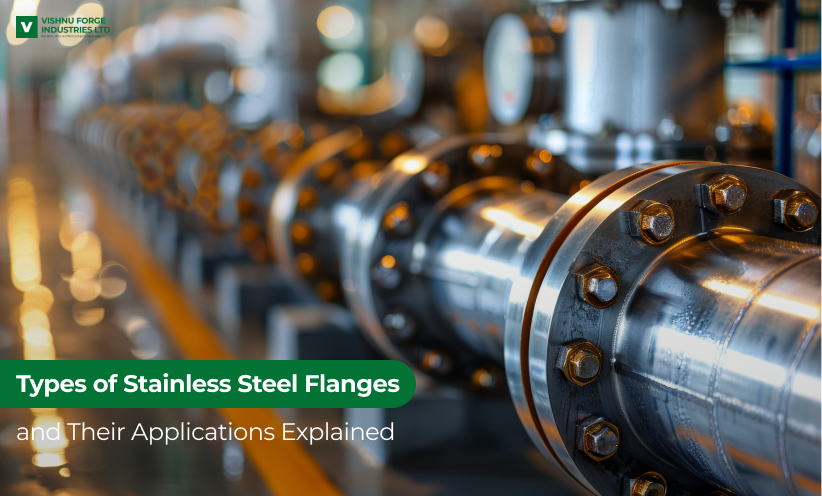Stainless steel flanges are a vital component in various industries, including petrochemical, food and beverage, construction, and automotive. They play a crucial role in connecting pipes, valves, and other equipment, ensuring a secure and leak-proof connection. In this article, we will delve into the different types of stainless steel flanges, their key features, and their applications.
Understanding Stainless Steel Flanges
Before we explore the various types of stainless steel flanges, it’s important to understand their definition and importance. Stainless steel flanges are disc-like or ring-shaped components that are used to connect pipes or valves together. They are typically made from stainless steel, which offers excellent corrosion resistance and durability.
The manufacturing process of stainless steel flanges involves precision and expertise. It begins with the selection of high-quality stainless steel, followed by cutting the material into the desired shape. The flanges are then machined to meet specific dimensional requirements and undergo quality testing to ensure their integrity.
Stainless steel flanges play a crucial role in various industries such as oil and gas, chemical, and petrochemical industries. They provide a secure and leak-proof connection between pipes, preventing any potential hazards or material leakage. The use of stainless steel ensures that the flanges can withstand high temperatures and pressures, making them ideal for demanding applications.
When it comes to installation, stainless steel flanges offer versatility and ease of use. They can be easily bolted or welded onto pipes, allowing for quick and efficient assembly. Additionally, their smooth surface finish helps in reducing friction and turbulence within the piping system, promoting better flow and efficiency.
Different Types of Stainless Steel Flanges
When it comes to stainless steel flanges, there is a wide range of options available, each designed to meet specific requirements and installation needs. Let’s take a closer look at some of the most common types:
Slip-On Flanges
Slip-on flanges are undoubtedly the most commonly used type of flange in various industries. These flanges feature a low hub and can be easily slipped onto the end of a pipe or fitting. One of the key advantages of slip-on flanges is their ease of disassembly and cleaning, making them ideal for systems that require frequent maintenance or inspection.
Furthermore, slip-on flanges provide a secure and reliable connection, ensuring minimal leakage and enhanced system performance. They are widely used in applications such as water treatment plants, chemical processing facilities, and oil refineries.
Weld Neck Flanges
When it comes to high-pressure applications, weld neck flanges are the go-to choice. These flanges feature a long tapered hub, providing excellent strength and resistance to deformation under extreme conditions. Weld neck flanges are typically butt-welded to the pipe, ensuring a robust and leak-proof connection.
Due to their exceptional durability and reliability, weld neck flanges are commonly used in industries such as petrochemical, oil and gas, and power generation. They can withstand high pressures and temperatures, making them suitable for critical applications where safety and performance are paramount.
Blind Flanges
As the name suggests, blind flanges are used to seal the end of a pipe or valve. These flanges are commonly employed in applications where the connection needs to be closed temporarily or permanently. Blind flanges are available in various thicknesses, allowing them to withstand high-pressure environments.
Blind flanges play a crucial role in preventing the flow of fluids or gases and are often used in industries such as pharmaceuticals, food processing, and chemical manufacturing. They provide a reliable and secure closure, ensuring the integrity of the system.
Socket Weld Flanges
Socket weld flanges are similar to slip-on flanges but come with a socket-like extension that houses the pipe. These flanges are primarily used for smaller-sized pipes and offer a smooth flow path, minimizing turbulence and pressure drop.
Socket weld flanges find their applications in industries such as HVAC, plumbing, and fire protection systems. They provide a strong and leak-resistant connection, making them suitable for both high and low-temperature environments.
Threaded Flanges
Threaded flanges feature internal threads that allow them to be easily screwed onto a pipe or fitting. These flanges are commonly used in low-pressure applications or situations where periodic maintenance is involved. Threaded flanges offer a simple and reliable connection, ensuring ease of installation and disassembly.
Industries such as water distribution, irrigation, and plumbing often rely on threaded flanges for their convenience and versatility. They provide a cost-effective solution without compromising on performance.
So, whether you require a flange for frequent disassembly, high-pressure applications, temporary closures, smooth flow paths, or simple maintenance, there is a stainless steel flange type perfectly suited to meet your specific needs.
Key Features of Stainless Steel Flanges
Stainless steel flanges offer several key features that make them highly desirable in various industries:
Durability and Strength
Stainless steel flanges are known for their exceptional durability and strength. They can withstand high-pressure and high-temperature environments without compromising their structural integrity.
Corrosion Resistance
One of the most significant advantages of stainless steel flanges is their resistance to corrosion. Stainless steel is highly resistant to rust, making it an ideal choice for applications that involve exposure to liquids or harsh chemicals.
Heat Resistance
Stainless steel flanges have excellent heat resistance properties, allowing them to withstand extreme temperatures without deformation or failure.
Furthermore, stainless steel flanges are also favored for their aesthetic appeal. The sleek and shiny surface of stainless steel lends a modern and sophisticated look to any industrial or commercial setting. This visual appeal not only enhances the overall appearance of the equipment but also reflects a sense of quality and professionalism.
Versatility
Another key feature of stainless steel flanges is their versatility. They come in a wide range of sizes, shapes, and types to suit different applications and requirements. Whether it’s for connecting pipes in a plumbing system or securing machinery in a manufacturing plant, stainless steel flanges offer a versatile solution that can be customized to fit specific needs.
Applications of Stainless Steel Flanges
Stainless steel flanges find application in a wide range of industries, including:
Use in the Petrochemical Industry
In the petrochemical industry, stainless steel flanges are widely used for connecting pipelines and equipment. They are capable of handling corrosive materials and high-pressure processes, making them indispensable in this sector.
Role in the Food and Beverage Industry
The food and beverage industry relies on stainless steel flanges for hygiene and corrosion resistance. They are used in processing equipment, pipelines, and storage tanks, ensuring the safe and efficient transport of food and beverages.
Importance in the Construction Industry
In the construction industry, stainless steel flanges are crucial for connecting pipes and structural elements. They provide a strong and reliable connection, minimizing the risk of leaks or failures in plumbing systems.
Applications in the Automotive Industry
The automotive industry utilizes stainless steel flanges in various components, such as exhaust systems and fuel lines. These flanges withstand high-temperature environments and provide a secure connection, contributing to the overall performance and safety of vehicles.
But the applications of stainless steel flanges do not stop there. Let’s explore a few more industries where these versatile components play a significant role:
Marine Industry
In the marine industry, stainless steel flanges are essential for connecting pipes and equipment on ships and offshore platforms. They are resistant to corrosion caused by saltwater and provide a reliable connection that can withstand the harsh conditions of the sea.
Moreover, stainless steel flanges are used in the construction of water treatment plants, where they ensure the efficient flow of water and prevent leaks or contamination.
Power Generation
In power generation facilities, stainless steel flanges are used in various applications, including connecting pipes in steam systems, gas turbines, and nuclear power plants. These flanges can withstand high temperatures and pressures, ensuring the safe and reliable operation of power generation equipment.
Furthermore, stainless steel flanges are used in the manufacturing of heat exchangers, which are crucial components in power plants. These flanges provide a secure connection that allows for efficient heat transfer, contributing to the overall efficiency of the power generation process.
In conclusion, stainless steel flanges are essential components that facilitate reliable and durable connections in various industries. Understanding the different types of flanges, their key features, and their applications is crucial for selecting the most suitable option for specific requirements. Whether it’s connecting pipes in a petrochemical plant, ensuring the safe transport of food and beverages, or supporting power generation systems, stainless steel flanges play a vital role in maintaining system integrity and efficiency.



